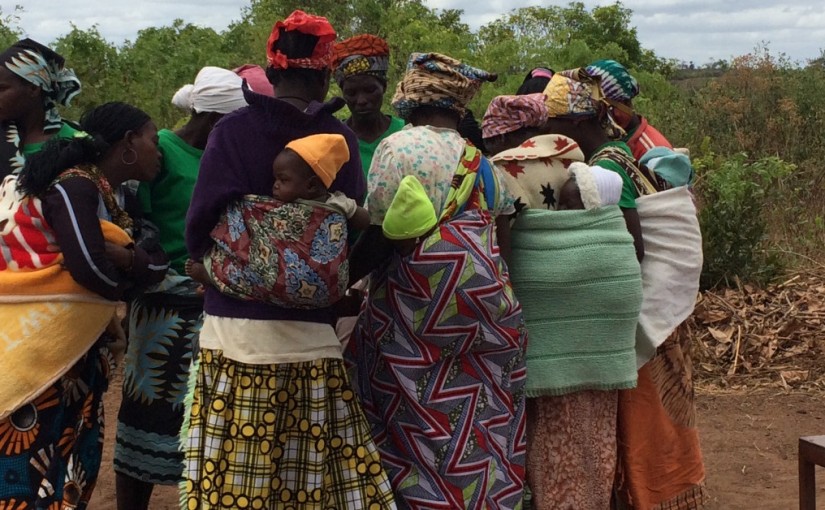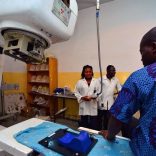Mozambique: Terrorism is a challenge to fundamental rights - Ombudsman in Palma district
World Food Day: More than 10 million Mozambicans living with chronic malnutrition since 2008

Promundo Global / Jane Kato–Wallace / File photo / A group of women and children in Barue, Manica Province, seen here during a Promundo’s formative research in nutrion. in 2015.
Sunday 16 October was World Food Day a fitting time to remark that more than ten million Mozambicans have been living with chronic malnutrition since 2008, mostly young women and children under 5 years of age living in rural areas.
President Filipe Nyusi, who has promised that adequate food would not be a privilege, asked a farmer this week how you could “make agriculture very quickly”. But academics and farmers and peasants know that there are no quick ways to produce food, especially with the challenges that Mozambique has not been able to overcome in its 41 years of independence are now joined by climate change.
“The climate is changing, and agriculture and food too” is the theme chosen this year by the United Nations Food and Agriculture Organisation (FAO) in order to “draw attention to the fact that we live in a period in which the climate change is a reality and that agriculture, livestock, forestry, fisheries sectors are seiously affected”. So said Castro Camarada, FAO representative in Mozambique at a press conference on Wednesday 12 October, explaining that “the impacts of climate change usually affect the poorest and most vulnerable”.
Of Mozambique’s 26.4 million inhabitants, the worst affected are 16.1 million farmers who practice subsistence and low profitability agriculture because limited or zero access to agricultural extension services and improved inputs.
The latest agro-livestock census shows that food production is concentrated in northern Mozambique, although ironically, according to the Ministry of Health, “chronic malnutrition is more significant in the provinces of Cabo Delgado (54.54 percent), Nampula ( 50.1 percent) and Tete (50.7 percent), although all provinces have above acceptable levels (above 20 percent).”

Zero hunger in Africa by 2025
According to health authorities, of the more than ten million undernourished Mozambicans, 4.7 million are young women of reproductive age and 3.8 million are children under 6 years old.
Malnutrition leads to the growth retardation in children, making them more vulnerable to infectious and degenerative diseases, and causing poor intellectual performance that generates decreased ability to work as adults and, in extreme cases, the death of children and their mothers.
Due to the complexity of the public health problem, a multisectoral action plan was launched in 2011, although official statistics suggest that little progress has been achieved.
“The work to combat food insecurity and chronic malnutrition in Mozambique is ongoing and long-term. Chronic malnutrition affecting children from 0 to 5 years of age, is extremely complex. We have very few examples where it was fought very quickly, for that implies several things, not only the nutritional component but also health, sanitation and water elements,” Camarada said.
According to Camarada, the FAO expects “to achieve zero hunger in Africa by 2025 and globally by 2030”.

Basic Food Basket recommended by MISAU to cost between 10 to 15 thousand meticais
Contrary to what was thought, chronic malnutrition is gaining ground in urban areas, particularly in Maputo and Matola, perhaps a combination of the higher cost of living and the lack of work.
The Ministry of Health of Mozambique (MISAU) recommends individuals to consume 3 kg of rice, 9.1 kg of maize flour, 2 kg of dry beans, 0.5 kg of peanuts, 3.5 kg of dried fish, 0.5 liter oil, 1.2 kg sugar, 1 kg of salt, 3.4 kg of green leaves and 3.6 kg of seasonal fruits per month.
For a family of five members this would cost between 10,000 to 15,000 meticais but the minimum wages this year were increased to just 3,298 meticais for workers in the agricultural sector, and 8,750 meticais for Mozambicans working in banks and insurance companies.
“It is necessary to review the state’s role in rural development and agriculture”
“There are several government strategies related to food and nutrition security. However, there is no government integrated, coherent and effectively implemented strategy to address climate change,” a book by the Rural Observatory of Mozambique (OMR) entitled “Challenges for Food Security and Nutrition in Mozambique” claims.
The publication, by academics João Carrilho, Mariam Abbas, António Júnior, José Chidassicua and João Mosca, suggests that in the medium term, “the government should redefine its role in rural and agricultural development, moving away from the paradigm of a “minimal state” in order to correct the distortions in production and markets that affect the economy as a whole, particularly the performance of small yielders.
“Macroeconomic management, particularly of the instruments with the greatest impact on agriculture and the rural context (exchange rates, credit, currency supply, budgets and investment), should be coordinated amongst them to ensure that policies, strategies and goals of the agricultural sector are implemented and achieved.
“Adequate resources should be allocated for the review of the legal and institutional framework of the relevant institutions responsible for enforcing the standards and procedures that specifically target the food system.
“Public policies must be stable, requiring organic constancy of the institutions and mandates, their leaders and technical staff and, above all, requiring strategies to guide the implementation and also guarantees on allocation of resources.
“Existing agricultural development models (family sector, agri-business, subcontracting, ’emerging farmers’, etc.), must find functionalities among them to allow the involvement of all, as well as the sharing of benefits.”
The OMR book further suggests that in the medium and long term, “it is necessary to review the state’s role in rural development and agriculture, as well as the public and agrarian policies so that they neither produce conflicting effects nor reverse policy decisions. The economic model requires adjustment in order to create more endogenous processes, by exploiting natural resources and local knowledge for an inclusive processes and participatory democracy”.












Leave a Reply
Be the First to Comment!
You must be logged in to post a comment.
You must be logged in to post a comment.